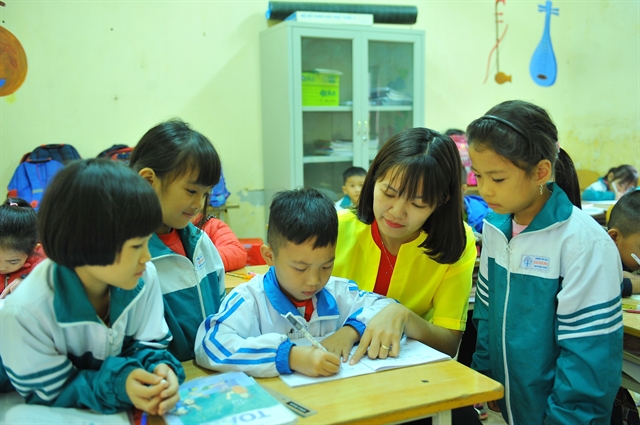 Society
Society


|
| A teacher and first graders at Cúc Phương Primary School in the northern province of Ninh Bình's Nho Quan District during a mathematics class. VNA/ VNS Photo Minh Đức |
Kiều Trinh
The Ministry of Education and Training has published 32 textbooks for first graders under the new general education curriculum issued in 2018. These textbooks will be used from the 2020 -2021 school year.
Students across the country are still using textbooks approved under the 2005 general education curriculum, including a set published by the Vietnam Education Publishing House and a number of Professor Hồ Ngọc Đại's Primary Educational Technology books.
In December 2018, the Ministry of Education and Training announced a new general education curriculum, including 27 subject curricula. Based on the curriculum, authors were tasked writing textbooks for evaluation. After two rounds of evaluation, 38 out of 49 manuscripts on nine subjects met the requirements.
On November 21, Minister Phùng Xuân Nhạ approved 32 of the books. The subjects include Vietnamese, maths, ethics, nature and society, physical education, music, fine arts and experimental activities. Most of the authors of the 11 "failed" manuscripts are expected to continue editing for re-evaluation in December.
According to the ministry, the new textbooks had been carefully compiled in accordance with the requirements of the new education curriculum. Many of the books apply modern teaching methods that were suitable for schools and students in Viet Nam.
Among the approved textbooks, the Vietnam Education Publishing House prevailed with 24, constituting four complete sets. Hanoi Pedagogical University and Ho Chi Minh City University of Education also had sets of four books approved.
Regarding concerns that the Vietnam Education Publishing House had the most approved titles, Thai Van Tai, director of the Primary Education Department, said the textbooks were compiled by various authors and publishers, and exclusivity had been minimised.
According to Nguyen Xuan Thanh, deputy director of the Secondary Education Department, with the new curriculum the textbooks were just part of the learning materials.
According to the Education Law 2019 that will take effect in July 2020, the selection of textbooks will be decided by provincial People's Committees. Currently, the Ministry of Education and Training is drafting a circular guiding the selection of textbooks, which will then be widely studied before issuing. The circular on the selection of textbooks will specify the composition of the board, including educational managers, scientists and a majority of teachers who directly teach the subjects.
Before March 2020, localities will need to set up selection boards and announce the results of selection of textbooks from the list published by the ministry. In this regard, some people suggest that in order to select the right textbooks that are suitable for students, teaching conditions in each locality, and information about textbooks for schools, administrators, teachers, parents and the general public must be complete, accurate and publicly available.
The ministry plans to implement this and organise training for teachers, as well as ensure the textbooks are ready for the 2020-2021 school year. VNS
The differences of new general education curriculum
Firstly, the current general education curriculum is content-oriented knowledge-transfer that does not help students apply what they have learned in practice.
The new general education curriculum aims to improve child development through basic, practical and modern knowledge with active learning methods to help students form and develop the skills expected by society. Education is not only about knowledge, it's about helping students complete tasks and solve problems effectively and creatively using what they have learned.
Secondly, the current general education curriculum has almost identical educational content for all students and without clear career orientations for students.
The new curriculum clearly distinguishes two phases: the basic education stage (grades 1 to 9) and the career-oriented education phase (grades 10 to 12). In the basic education stage, the curriculum integrates related content of some subjects in the current programme to form integrated subjects to avoid overlapping of educational content and reduce the number of subjects reasonably.
In the career-oriented education phase, students are given a choice of subjects and educational activities that suit their interests, competence and career orientation.
Thirdly, the new curriculum pays more attention to connections between the content of classes and grades in each subject, and between subject curricula in each class and grade.
Fourthly, the new curriculum ensures unified orientation and core educational content, which are compulsory for students nationwide, while empowering local and school authorities to take the initiative and responsibility in their selection of some educational material, while implementing education plans suitable to local conditions.